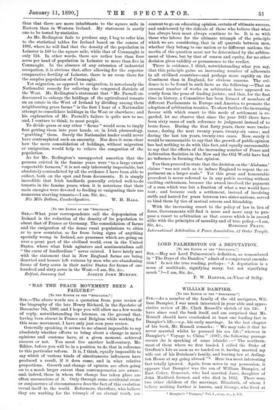"HAS THE PEACE MOVEMENT BEEN A FAILURE ?"
Pre THE EDITOR OF THE "SPECTATOR." j SIR,—The above words are a quotation from your review of the biography of the late Henry Richard, in the Spectator of December 7th, 1889, and I hope you will allow me a few words of reply, notwithstanding its lateness, on the ground that, having been absent in France and Belgium while working for this same movement, I have only just seen your review.
Generally speaking, it seems to me almost impossible to say absolutely whether efforts to bring about a change in men's opinions and customs have, at a given moment, achieved success or not. You must live another half-century, Mr. Editor, before you will be in a position to do that in reference to this particular reform. It is, I think, equally impossible to say which of various kinds of simultaneous influences have produced a result, if it does come, and in what relative proportions. Growth and change of opinion are often going on to a much larger extent than contemporaries are aware ; and, indeed, those in whom the change has taken place are often unconscious of it. Only through some accidental event or conjuncture of circumstances does the fact of this evolution reveal itself to the world. Reformers, therefore, who believe they are working for the triumph of an eternal truth, are content to go on educating opinion, certain of ultimate success, and undeterred by the ridicule of those who believe that what has always been must always continue to be. It is so With those who labour for the ultimate triumph of the principle which we are considering, that in all quarrels between men, whether they belong to one nation onto different nations, the merits of the question must not be determined by the arbitra- ment of blows, but by that of reason and equity, for no other decision gives validity or permanence to the verdict.
There is evidence, I think, notwithstanding what you say, that this principle gains an increasing number of adherents in all civilised countries—and perhaps more rapidly on the Continent than in England, for obvious reasons. The evi- dence is to be found in such facts as the following :—That an unusual number of works on arbitration have appeared re- cently from the pens of leading jurists ; and that, for the first time in history, a Committee has been formed of members of different Parliaments in Europe and America to promote the adoption of arbitration treaties. To show further the increasing favour with which resort to this mode of settlement is re- garded, let me observe that since the year 1815 there have been sixty cases of such reference to judgment instead of to brute force. During the first forty years, there were twelve cases ; during the next twenty years, twenty-six cases ; and during the last ten years, twenty-two cases. Now, surely it would be unreasonable to say that the growth of public opinion has had nothing to do with this fact, and equally unreasonable to say that the efforts of the increasing number of Peace and Arbitration Societies in the New and the Old World have had no influence in forming that opinion.
You then proceed to state that the decision on the Alabama' claims " was not such as to induce England to repeat the ex- periment on a larger scale." Yet this great and honourable precedent is never referred to hi any public meeting without exciting enthusiasm, because the award involved the payment of a sum which was but a fraction of what a war would have cost; and because such a settlement, instead of involving strife and hatred for years between two sister-nations, served to bind them by ties of mutual esteem and friendship.
With the increasing resort to the policy of law in lieu of force, Governments will find it more and more easy to pro- pose a resort to arbitration as that course which is in accord alike with the principles of morality and of true policy.—I am,






































 Previous page
Previous page